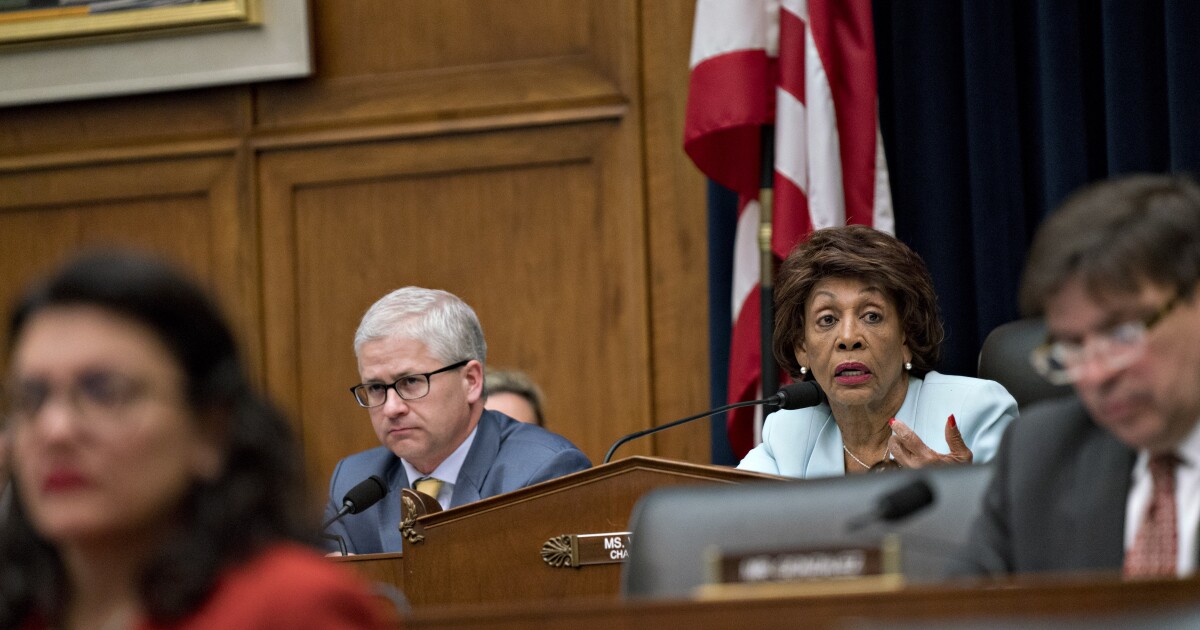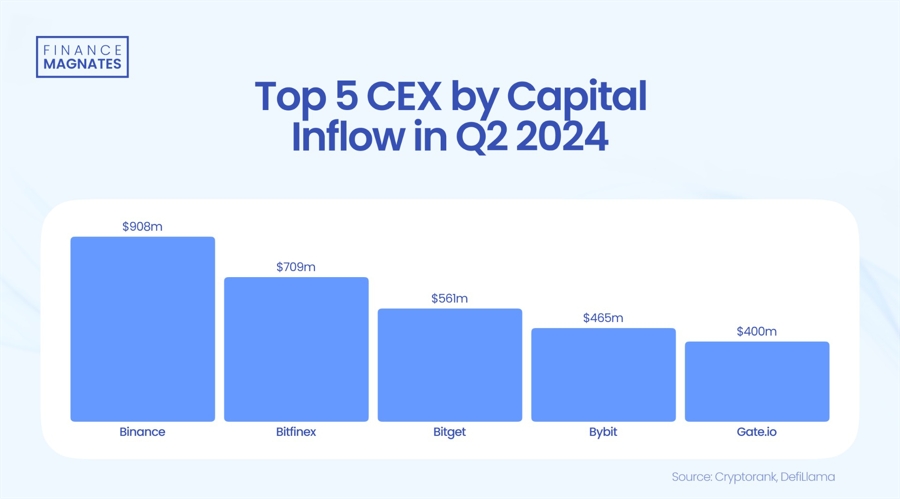News
Does the latest cryptocurrency law represent an opportunity for banks to circumvent regulation?

Rep. Maxine Waters, a California Democrat and ranking member of the House Financial Services Committee, said a Republican-led cryptocurrency bill could open the door for financial firms to evade Securities and Exchange Commission oversight.
Andrew Harrer/Bloomberg
WASHINGTON-A cryptocurrency bill passed by an unusually wide bipartisan margin in the House it could create a loophole for traditional financial companies – including banks – to bypass tougher regulation.
Last month the House voted to pass a bill establishing a regulatory regime for cryptocurrencies, and the bill passed with unusual bipartisan support. Seventy-one Democrats voted for the bill, including senior party members such as former House Speaker Rep. Nancy Pelosi of California.
The bill faces tougher odds in the Senate, where Senate Banking Committee Chairman Sherrod Brown, D-Ohio, has been skeptical of cryptocurrency legislation that he sees as too favorable to the cryptocurrency industry.
But the House vote was a turning point for cryptocurrencies in Washington, as more and more Democratic lawmakers appear to be interested in considering some sort of bill. Senate Majority Leader Chuck Schumer, D-N.Y., along with a group of mostly Northeast and West Coast Democrats, are growing friendlier toward a narrow set of crypto issues, creating an opportunity for the cryptocurrency industry and Republicans to find common ground and pass a bill establishing a regulatory regime for the industry.
A number of Democratic senators, including Schumer, voted in favor of the Congressional Review Act’s challenge to SEC Staff Accounting Bulletin 121, which banks claim effectively reduces their ability to store cryptocurrency. Although Biden vetoed this challenge on Friday, the bill that recently passed the House would have a very similar effect, preventing the SEC from making rules or issuing guidelines that would prevent banks from entering the cryptocurrency custody business.
Looking ahead, a key element of the upcoming debate on the cryptocurrency law, known as the “Financial Innovation and Technology for the 21st Century Act” or FIT21, will be the implications of the law not only on cryptocurrencies, but also on traditional financial institutions. including banks.
Some House Democratic members argued that the bill could make it easier for banks — typically larger banks with consolidated trading desks — and asset managers to create assets that would be overseen by the Commodity and Futures Trading Commission rather than the Securities and Exchange Commission, which is generally considered to have a lighter regulatory touch.
Specifically, much of the concern centers on a section titled “Clarity for Assets Offered as Part of an Investment Contract.” House Democrats argued that this section was added only in the most recent iteration of the legislation and after the bill passed through the House Financial Services Committee’s markup.
“Language was added to the bill after it was flagged by the jurisdiction committees to also allow some traditional titles to exist even in this regulatory no man’s land,” said Rep. Maxine Waters, D-Calif., on the House plan.
The section outlines the ways in which a “contractual investment asset” – normally something that would fall under the purview of the SEC – would not be regulated by the SEC if it meets certain decentralization criteria, including whether the asset transaction is registered on a cryptographically protected media. public register.
Graham Steele, a fellow at the Roosevelt Institute and until recently assistant secretary for financial institutions at the Treasury Department, said that under the bill, banks and other financial institutions could set up a blockchain system, outsource that operation or spin it, and therefore anything listed on that platform would be outside the scope of SEC regulation.
“There are ways you could get a bank to support a blockchain network,” he said. “Any person can self-certify to the SEC that the network and related digital assets are decentralized. And then, assuming the SEC… doesn’t dispute that, they move into the digital commodities space and have CFTC oversight.”
The risk of larger institutional players entering this market is twofold, Steele said. The CFTC requires less information and offers consumers less protection than the SEC, which could result in harm to consumers, while the entry of large, traditional companies could create financial bubbles that threaten financial stability.
“So there is the micro-consumer harm caused by investing in products and services and not necessarily having all the information to understand the risks,” he said. “And then, number two, you could have large financial institutions in charge making these markets bigger and bigger, which could turn this into a financial stability issue.”
Lee Reiners, a professor at Duke Law who studies fintech and cryptocurrency policy, said that, in theory, a large nonbank financial firm like BlackRock, which already has a tokenized fund, could make some changes to that offering to meet the design’s definition of law. of what can be classified as goods. Reiners, along with numerous financial law academics and consumer groups, wrote to both the House Financial Services Committee outlining these concerns for lawmakers.
“If you give Wall Street the opportunity to game the system and go for a lighter regulatory regime, they will,” he said. “You can imagine someone saying, ‘OK, if you don’t want to register with the SEC, just put it on the blockchain.’”
Republicans, meanwhile, argue that their bill does not pose this dilemma. Rep. French Hill, R-Ark., a lead sponsor of the legislation, said the bill specifically defines assets offered as part of an investment contract as securities, unless they are otherwise defined as securities. This is part of a complex legal criterion called Howey’s test established by a 1946 Supreme Court case.
“The minority has repeatedly charged that somehow with this bill a great securities loophole is being offered and opened,” he said. “That’s not really true, it’s just not a factual statement.”
Hill said the term “investment contract” is a “fungible digital representation” and that the bill specifically defines digital assets as not including notes, stocks, Treasury securities and security-based swaps.
“So it doesn’t open the loophole that makes the ranking member of the Financial Services Committee pay,” he said.
This assessment has also gained traction among other experts. Zachary Zweihorn, a partner at Davis Polk, said the idea that financial institutions “can simply slap a blockchain label on something” and then opt out of the securities regulatory framework is “unrealistic under the text of the bill.” .
“The way I read it, it says that an asset sold under an investment contract is not automatically a security,” said Zachary Zweihorn, a partner at Davis Polk. “Unless it’s a security, which is kind of a circular.”
If a large bank or other financial institution creates an asset that meets the definition of a digital asset that would be regulated by the CFTC under the Republicans’ cryptocurrency bill, Zweihorn said the CFTC may be the best place to regulate that asset.
“It is difficult to imagine a bank creating this type of business that meets this definition,” he said. “And you know, if they do, it’s probably not the worst idea for it to end [to the CFTC].”
News
Block Investors Need More to Assess Crypto Unit’s Earnings Potential, Analysts Say — TradingView News

Block, a payments technology company led by Jack Dorsey square could become a formidable player in the cryptocurrency mining industry, but Wall Street will need details on profit margins to gauge the positive impact of the business on earnings, analysts said.
Block signed its first large-scale cryptocurrency mining hardware pact on Wednesday, agreeing to supply its chips to bitcoin miner Core Scientific CORZbut no financial details were disclosed.
JP Morgan estimates the deal could net Block between $225 million and $300 million, but said more information will be needed to assess the hardware business’s long-term earnings potential.
“We still have a lot to learn in terms of the margins of this business, so we are hesitant to underwrite this transaction until we know more about the cadence and economics,” J.P. Morgan said.
The deal marks a major step for the payments company, which started out as “Square” in 2009 before rebranding in 2021 in a nod to its focus on crypto and blockchain technologies.
Dorsey, who co-founded and ran Twitter (now known as “X”), has long been bullish on Bitcoin. Block began investing 10% of its monthly gross profit from Bitcoin products into Bitcoin in April.
In the first quarter, nearly 9% of the company’s cash, cash equivalents, and marketable securities consisted of bitcoin.
“This development (the deal with Core Scientific) is further evidence of Block’s role as an emerging leader in the crypto hardware ecosystem,” Macquarie analysts Paul Golding and Emma Liang wrote in a note.
Analysts say similar deals to follow could further validate Block’s reputation in the industry.
But J.P. Morgan said the stock’s performance will be determined by Block’s other segments, such as Square and Cash App.
Block shares have lost nearly 17% this year.
News
This Thursday’s US Consumer Price Index could be a game-changer for cryptocurrencies!

3:30 PM ▪ 4 minute read ▪ by Luc Jose A.
This Thursday, attention will be focused on the United States with the anticipated release of the Consumer Price Index (CPI). This economic indicator could trigger significant movements in the markets, especially for the U.S. dollar and cryptocurrencies. While investors remain vigilant, speculation is rife about the potential impact of these key figures.
The Consumer Price Index: The Cornerstone of the American Economy
The Consumer Price Index (CPI) is a key measure of inflation which reflects changes in the price of goods and services purchased by American households. This index is calculated monthly by the Bureau of Labor Statistics (BLS) and serves as a barometer for the cost of living. The consumer price index covers a wide range of products, including food, clothing, housing, health care, and entertainment. Economists and policy makers closely monitor this data to anticipate economic trends and adjust monetary policies accordingly.
The June CPI data is due to be released this Thursday at 2:30 p.m., and is highly anticipated by investors. The current consensus is for headline annual inflation to decline to 3.1%, from 3.3% the previous month, while core inflation is expected to remain stable at 3.4%.
THE BIGGEST EVENT THIS WEEK 🚨
The U.S. Consumer Price Index is expected to
PUBLICATION TODAY AT 8:30 AM ET.EXPECTATIONS ARE 3.1% WHILE
LAST MONTH THE CONSUMER PRICE INDEX (CPI) WAS 3.3%HERE ARE SOME SCENARIOS 👇
1) CPI above 3.1%
THIS WILL BE A DAMAGE TO THE MARKET
GIVEN THAT THE LAST TIME THE CPI DATA… photo.twitter.com/yudjPLPl8g— Ash Crypto (@Ashcryptoreal) July 11, 2024
Consumer Price Index Release: What Does It Mean for the Dollar and Bitcoin?
Inflation as measured by the consumer price index is a key determinant of the value of the US dollar. If the consumer price index declines more than expected, it could reinforce expectations of a rate cut by the Federal Reserve in September, thus weakening the dollar. A weaker dollar could benefit GBP/USD, which recently broke a major resistance level, and Bitcoin, which could see its price rise due to increased demand from institutional investors.
Current forecasts suggest that headline inflation will decline to 3.1%, with core inflation holding steady at 3.4%. However, a surprise increase in the consumer price index could upset these expectations. Fed Governor Lisa Cook has mentioned the possibility of a soft landing for the economy, with inflation falling without a significant increase in unemployment, which could lead the Fed to consider rate cuts. This outlook is particularly favorable for stock markets and cryptocurrencies, including Bitcoin, which could benefit from a more accommodative monetary policy.
According to experts at 10x Research, especially their CEO Markus Thielen, Bitcoin could see a significant increase if the CPI data confirms a decline in inflation. Thielen indicated that Bitcoin could reach almost $60,000, a prediction that has already been reflected with a rise to $59,350 before the data was released.
Therefore, Thursday’s CPI data could determine the future direction of financial and cryptocurrency markets. High inflation could strengthen the US Dollarwhile a drop in inflation could pave the way for rate cuts by the Fed, thus giving a boost to Bitcoin and other digital assets.
Enhance your Cointribune experience with our Read to Earn program! Earn points for every article you read and access exclusive rewards. Sign up now and start earning rewards.
Click here to join “Read to Earn” and turn your passion for cryptocurrencies into rewards!
Luke Jose A.
A graduate of Sciences Po Toulouse and holder of a blockchain consultant certification issued by Alyra, I joined the Cointribune adventure in 2019. Convinced of the potential of blockchain to transform many sectors of the economy, I am committed to raising awareness and informing the general public about this ever-evolving ecosystem. My goal is to enable everyone to better understand blockchain and seize the opportunities it offers. Every day, I strive to provide an objective analysis of the news, decipher market trends, convey the latest technological innovations and put into perspective the economic and social issues of this ongoing revolution.
DISCLAIMER
The views, thoughts and opinions expressed in this article are solely those of the author and should not be construed as investment advice. Do your own research before making any investment decisions.
News
Crowd Expects Bitcoin Bounce Suggests Further Losses, As RCO Finance Resists Crash

Bitcoin is seeing a rebound after its recent price crash to $53,000. Other altcoins are subsequently recovering, with many cryptocurrency investors increasingly making new entries. However, Santiment warned against this hopium, suggesting that Bitcoin could extend its price losses.
As the broader market anticipates Bitcoin’s next price action, RCO Finance (RCOF) demonstrates resilience, attracting thousands of people in influxes. Read on for more details!
RCO Finance challenges the market crisis
RCO Finance (RCOF) is approaching $1 million in funding raised, amid growing interest from institutional traders seeking stability from Bitcoin’s wild price swings. While much of the broader market has seen significant price losses, RCO Finance has remained resilient, experiencing a surge in its pre-sale orders.
As a result, the project seems oblivious to the current market conditions, leading top market experts to take a deep dive into its ecosystem. They identified why RCO Finance was able to withstand the bearish pressure and its potential to hold up even stronger during the impending broader market crash.
The main reason was related to the innovative use of RCO Finance AI Trading Tools as a Robo Advisor. This tool has been integrated into RCO Finance’s cryptocurrency trading platform, offering full automation and highly accurate market forecasts to help investors make informed decisions.
Read on to learn more about this tool and other exciting features of RCO Finance!
Bitcoin Bounces Amid Impending Crash
Bitcoin is bouncing back, rallying 8% after plunging to its lowest point since February on July 5. While this rebound has triggered a bullish wave in the broader market, many cryptocurrency analysts predict it could be short-lived as Bitcoin is poised for an imminent crash toward the $50,000 zone.
On a Post X (formerly Twitter)Santiment revealed that while the crowd is anticipating a Bitcoin rally, this potential crash could trigger FUD and panic, causing average traders to wither and give up on Bitcoin. The platform noted that Bitcoin rally has historically occurred after these weak hands sold their holdings.
In particular, these cryptocurrency analysts speculate that the previous and upcoming Bitcoin crash is largely the result of bearish market psychology, as opposed to large BTC sell-offs by the German government and Mt. Gox. In particular, Ki Young Ju, founder and CEO of CryptoQuant, noticed that “the sales were rather negligible, given the overall liquidity of Bitcoin.”
Enjoy seamless investing on RCO Finance
RCO Finance is making investing easier and easier, democratizing access to high-level tools and cryptocurrency earnings that were once reserved for professional and institutional investors. It has also prioritized accessibility, allowing investors of all levels to easily navigate its features through its intuitive interface.
Additionally, they can also maintain anonymity and privacy as the platform has no KYC requirements. To build trust, the platform has instead emphasized regular smart contract audits by respected security firm SolidProof.
Performance data shows massive adoption, indicating that it is doing its job effectively. Investors can also capitalize on RCO Finance’s fast transaction speeds and incredibly low transaction fees, with leverage options up to 1000x to further optimize their portfolios and maximize returns.
Leverage RCO Finance’s pre-sale earnings
An in-depth analysis of the RCO Finance ecosystem revealed that it has strong potential to rival and surpass major cryptocurrencies in the cryptocurrency industry. With a very limited total token supply and excellent tokenomics, RCO Finance is poised to reach its target of $1 billion in market cap upon its official launch.
RCO Finance has adopted a deflationary model, strategic burn mechanisms, and a vesting schedule. However, the project encourages long-term holding by focusing on sustained growth through incredibly high staking rewards.
RCOF tokens are currently available at an altcoin price of $0.01275 in progress Pre-sale Phase 1. This is likely the lowest price these coins will ever trade at, as they are expected to increase exponentially with each new presale phase.
With RCOF expected to be $0.4 at launch, investors jumping in now can expect a Return 30x on their investment!
For more information on RCO Finance (RCOF) presale:
Join the RCO Financial Community
Disclaimer: The statements, views and opinions expressed in this article are solely those of the content provider and do not necessarily represent those of Crypto Reporter. Crypto Reporter is not responsible for the reliability, quality and accuracy of any material in this article. This article is provided for educational purposes only. Crypto Reporter is not responsible or liable, directly or indirectly, for any damage or loss caused or alleged to be caused by or in connection with the use of or reliance on any content, goods or services mentioned in this article. Do your own research and invest at your own risk.
News
Bitget Ranks Third Among Cryptocurrency Exchanges by Capital Inflows in Q2

Although Bitget is not the largest cryptocurrency exchange in terms of total volumes, it closed a favorable quarter. From April to June, the platform ranked third in net capital inflows and showed the strongest growth in market share compared to its competitors.
In the second quarter, investors moved $700 million into Bitget, and activity on the platform increased by nearly 50%.
The exchange has seen a surge in user funds, with Bitcoin (BTC), Tether (USDT), and Ethereum (ETH) rising 73%, 80%, and 153%, respectively, in the first six months of the year. This growth coincided with adding 2.9 million new users to the platform.
This has positioned Bitget among the top exchanges with the highest positive net inflows in the last quarter. Only Binance, which remains the market leader, and Bitfinex have performed better in this category.
According to CCData’s latest H2 Outlook Report, the exchange also recorded the highest market share growth among centralized exchanges, increasing 38.4% from H2 2023 to H1 2024.
Bitget’s spot trading volume has also seen a visible increase, going from $28 billion in Q1 to $32 billion in Q2, marking an increase of over 10%. The platform’s monthly visitors have reached 10 million. Although its volumes are increasing, Bitget still does not rank among the top 10 cryptocurrency exchanges in terms of spot trading.
The changes taking place in the centralized cryptocurrency exchange market show that competition is becoming more and more intenseAn example of this is the recent surge in popularity of Bybit, which has become the second largest exchange in terms of spot trading volumes.
Sports Sponsorships and New Products
Gracy Chen, Source: LinkedIn
Gracy Chen, CEO of Bitget, commented on the quarterly performance, saying, “Q2 2024 was a pivotal period for Bitget. Our collaboration with Turkish athletes, along with significant growth in users and website traffic, is part of our global expansion.”
In an effort to expand its global presence, Bitget has partnered with three Turkish national athletes as part of its #MakeItCount campaign, starring Lionel Messi. The deal with the famous footballer It was signed in Februaryto build brand presence in Latin America.
The exchange also launched a $20 million TON Ecosystem Fund in partnership with Foresight Ventures to support early-stage projects on The Open Network.
The exchange introduced two new initial token listing products, PoolX and Pre-market, which collectively launched over 100 projects. Additionally, Bitget’s native token, BGB, was recognized as the best-performing centralized exchange token in June and was ranked among the top 10 cryptocurrencies by Forbes.
In its latest move, the cryptocurrency exchange aimed to become a regulated player in IndiaThe announcement comes as the world’s most populous democracy grapples with the complexities of integrating cryptocurrencies into its financial ecosystem.
Even recently,
Bitget Wallet Announced a joint investment with cryptocurrency investment firm Foresight X in Tomarket, a decentralized trading platform. This initiative targets emerging asset classes and aims to expand the portfolio’s services beyond traditional decentralized exchanges (DEXs).
Although Bitget is not the largest cryptocurrency exchange in terms of total volumes, it closed a favorable quarter. From April to June, the platform ranked third in net capital inflows and showed the strongest growth in market share compared to its competitors.
In the second quarter, investors moved $700 million into Bitget, and activity on the platform increased by nearly 50%.
The exchange has seen a surge in user funds, with Bitcoin (BTC), Tether (USDT), and Ethereum (ETH) rising 73%, 80%, and 153%, respectively, in the first six months of the year. This growth coincided with adding 2.9 million new users to the platform.
This has positioned Bitget among the top exchanges with the highest positive net inflows in the last quarter. Only Binance, which remains the market leader, and Bitfinex have performed better in this category.
According to CCData’s latest H2 Outlook Report, the exchange also recorded the highest market share growth among centralized exchanges, increasing 38.4% from H2 2023 to H1 2024.
Bitget’s spot trading volume has also seen a visible increase, going from $28 billion in Q1 to $32 billion in Q2, marking an increase of over 10%. The platform’s monthly visitors have reached 10 million. Although its volumes are increasing, Bitget still does not rank among the top 10 cryptocurrency exchanges in terms of spot trading.
The changes taking place in the centralized cryptocurrency exchange market show that competition is becoming increasingly intenseAn example of this is the recent surge in popularity of Bybit, which has become the second largest exchange in terms of spot trading volumes.
Sports Sponsorships and New Products
Gracy Chen, Source: LinkedIn
Gracy Chen, CEO of Bitget, commented on the quarterly performance, saying, “Q2 2024 was a pivotal period for Bitget. Our collaboration with Turkish athletes, along with significant growth in users and website traffic, is part of our global expansion.”
In an effort to expand its global presence, Bitget has partnered with three Turkish national athletes as part of its #MakeItCount campaign, starring Lionel Messi. The deal with the famous footballer It was signed in Februaryto build brand presence in Latin America.
The exchange also launched a $20 million TON Ecosystem Fund in partnership with Foresight Ventures to support early-stage projects on The Open Network.
The exchange introduced two new initial token listing products, PoolX and Pre-market, which collectively launched over 100 projects. Additionally, Bitget’s native token, BGB, was recognized as the best-performing centralized exchange token in June and was ranked among the top 10 cryptocurrencies by Forbes.
In its latest move, the cryptocurrency exchange aimed to become a regulated player in IndiaThe announcement comes as the world’s most populous democracy grapples with the complexities of integrating cryptocurrencies into its financial ecosystem.
Even recently,
Bitget Wallet Announced a joint investment with cryptocurrency investment firm Foresight X in Tomarket, a decentralized trading platform. This initiative targets emerging asset classes and aims to expand the portfolio’s services beyond traditional decentralized exchanges (DEXs).
-

 DeFi12 months ago
DeFi12 months agoDeFi Technologies Appoints Andrew Forson to Board of Directors
-

 Fintech12 months ago
Fintech12 months agoUS Agencies Request Information on Bank-Fintech Dealings
-

 News1 year ago
News1 year agoBlock Investors Need More to Assess Crypto Unit’s Earnings Potential, Analysts Say — TradingView News
-

 DeFi12 months ago
DeFi12 months agoSwitchboard Revolutionizes DeFi with New Oracle Aggregator
-

 DeFi12 months ago
DeFi12 months agoIs Zypto Wallet a Reliable Choice for DeFi Users?
-

 News1 year ago
News1 year agoBitcoin and Technology Correlation Collapses Due to Excess Supply
-

 Fintech12 months ago
Fintech12 months agoWhat changes in financial regulation have impacted the development of financial technology?
-

 Fintech12 months ago
Fintech12 months agoScottish financial technology firm Aveni secures £11m to expand AI offering
-

 Fintech12 months ago
Fintech12 months agoScottish financial technology firm Aveni raises £11m to develop custom AI model for financial services
-

 News1 year ago
News1 year agoValueZone launches new tools to maximize earnings during the ongoing crypto summer
-

 Videos6 months ago
Videos6 months ago“Artificial intelligence is bringing us to a future that we may not survive” – Sco to Whitney Webb’s Waorting!
-

 DeFi1 year ago
DeFi1 year agoTON Network Surpasses $200M TVL, Boosted by Open League and DeFi Growth ⋆ ZyCrypto


















